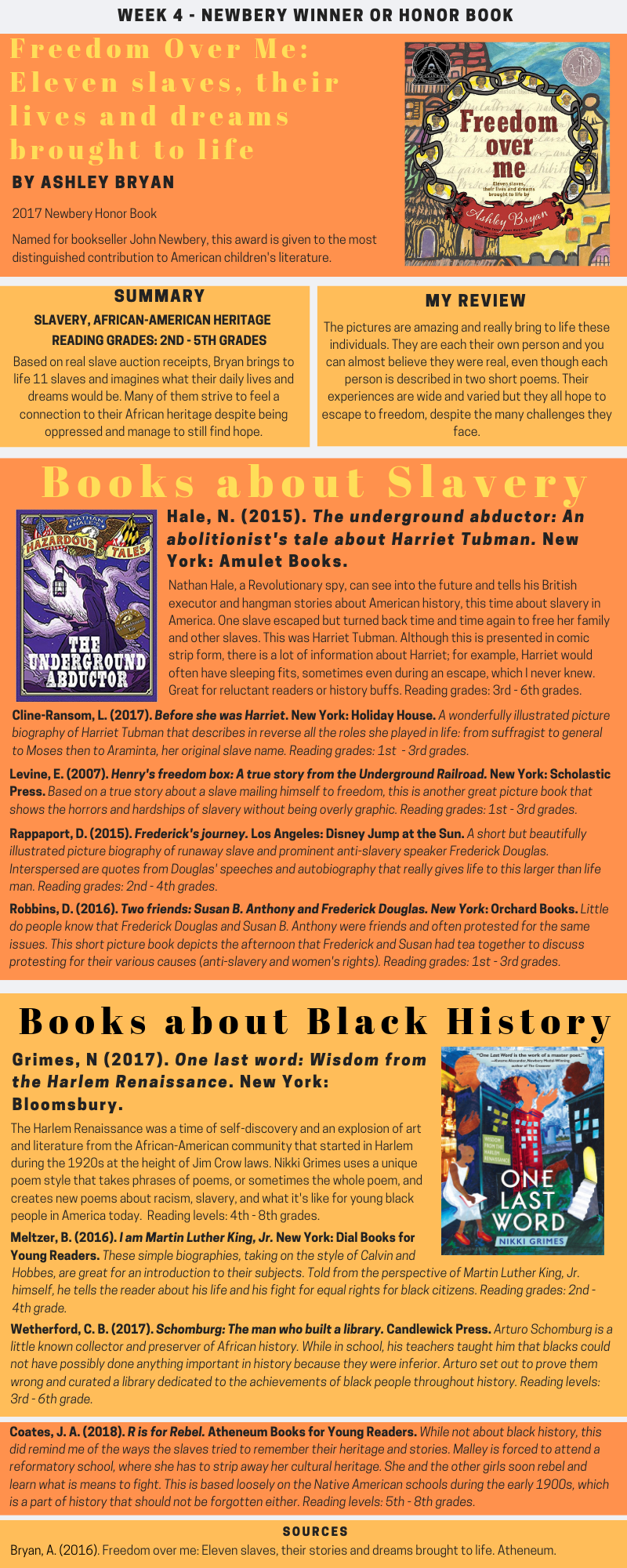This week, we talked about the Newbery award and about previous winners and honor books. I’m pleased to say I actually read the Newbery book from this year before it was even announced – Mercy Suarez Changes Gears. That was so good and I hope others like it too! But for class, I was assigned to read Freedom over Me: Eleven slaves, their lives and dreams brought to life by Ashley Bryan.
The author’s inspiration was finding some old slave auction receipts. On the receipt, it lists the names of the slaves and how much they’re worth…but not much else. Not their age or occupation or anything. It also lists various other property items so you can see how much a slave, a human being, was worth compared to a cow or a piece of machinery. Seeing the paper really hits home that slaves were often thought of as property and nothing else.
Bryan took these names and imagined who these people were, what their hopes and dreams were like, and what their lives as slaves were like. Then she wrote two poems for each name, one detailing the slave’s work in the house or on the plantation, and the other describing their dreams. They dreamt of Africa, their homes and family, and they dreamt of freedom and running away and trying to stay together even though their mistress was preparing to sell them.
It’s simple enough for kids to understand the horrors of slavery and their hardships but without being overly graphic. I don’t know about you, but some parents don’t want to have that kind of conversation with their kids. Maybe they’re too young and wouldn’t understand or perhaps the parents are afraid they don’t know the subject well enough to explain it without being offensive or incorrect. But this would be simple enough for kids to grasp that life was hard and unfair for slaves. It’s a part of our history that we should remember and tell kids that it was wrong and we can do better, not brush it under the rug and forget that it ever happened.
In addition to reading this book, I also read some others about slavery and notable slaves, like Harriet Tubman and Frederick Douglas. I’d like to read the newest biography about him but it’s so massive I’m probably going to have to wait until class is over. I really loved the Underground Abductor book about Harriet Tubman. If you’ve never read the Nathan Hale series or heard of them, you should! They’re short nonfiction comic books told by Nathan Hale, who was a revolutionary spy that was executed by the British. Since he’s located at the center of history, Nathan can glimpse into the future and tells his British jailor and hangman moments of American history. It’s a funny premise, especially since Nathan Hale, a real spy, and the author share the same name (no relation, I believe, though).
And if you’re not sure about mixing nonfiction and comic books, this has surprisingly a lot of information, more so than I was expecting. For example, I knew that Harriet had been hit in the head when she visited the local general store and failed to stop a runaway slave. But what I didn’t know was that the injury was serious enough that she entered a coma and afterward suffered sleeping fits, where she would fall asleep without any warning then wake up minutes or hours later as if nothing had happened. While the comic book makes light of this injury, they also emphasize the seriousness of this condition, especially if she were leading a group of slaves to freedom but fell asleep at a crucial moment. Again, much like Freedom Over Me and the other books on this list, they don’t go into gory details about slavery but emphasize just how hard and horrible life was for Harriet and other slaves. This series does that very well (they also have a book about the Donner Party, which, if you don’t know your history, was the pioneer party that got stuck in a terrible snowstorm that resulting in some members eating their dead).
Lastly, I loved learning about Arturo Schomburg, who was one of many to preserve African culture and history. In Schomburg: The Man Who Built a Library, you not only learn about Arturo and his endeavors to find famous black people but also the people he learned about. For example, Mozart was half creole, but when you think Mozart, you probably think of the pasty-white picture of him. Another example, although this isn’t in this book but in One Last Word, is Langston Hughes. We studied his poem We Wear the Mask and was one of my favorite poems we studied in high school and college. And yet we never talked about him or his life so I didn’t realize until I read this book that he was African-American. That’s probably more my fault than anything else, though, for never making the connection between Langston Hughes and this poem.
Anyway, that’s it for this week! Another week, another infographic. At least I’m getting faster at making them.
